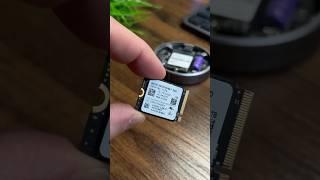
FAULTY Network Switch Ubiquiti UniFi - Pulsing Power - Can it be Fixed?
Комментарии:

Hope to see some video's of you learning how to use the scope. As I'm in the same boat and know equally as little about what I'm doing when working on electronics ;)
Ответить
Fun stuff.
Ответить
Vince, you are my hero, my CAPtain. For attempting to and actually fixing a capacitor! Cheers from the USA!
Ответить
Vince, place a light bulb in series with the live of the power cord. It will prevent the device to sustain more damage, avoid tripping the circuit breaker, and light up indicating any short with the equipment.
Ответить
ONE thing about "real" oscilloscopes: the ground on the probe is connected to the ground on the mains. If you're probing between components and you connect the probe's ground to a live part, you're connecting that part to earth and everything goes boom - or, at least, your fuses do. Battery-operated oscilloscopes have this single big plus of not being connected to earth.
Learning how to use an oscilloscope is pretty simple. Learning how NOT to use it requires a lot of burned circuits :D

absolutely brilliant fix Vince, looking forwards to a million subs! (top man for fixing a faulty cap).
Ответить
Power supplies on these are notoriously bad. Mine died a couple of months out of warranty... Ubiquiti actually replaced the switch despite it being out of warranty.
Ответить
Instead of fixing the power supply, you could just use a regular laptop charging brick. Anyway great video!
Ответить
@Mymatevince
May we quote Albert Einstein? "The person who never made a mistake, never made anything". This is true, you dropped a clanger, but so what? It's all a big learning curve.
Capacitors can be awkward at the best of times, often reading ok, when they are not. Caps can fail under "load conditions", but read ok when out of circuit. With caution, we can only advize applying a bench power supply upto the suspect capacitor, while observing it's under load behaviour with a multimeter. CAUTION MUST BE OBSERVED IF USING THIS METHOD, YOU DO SO AT YOUR OWN RISK!!
Many Thanks For Your Latest Content.
Cheers.
👍👍👍👍👍👍👍👏👏👏👏👏❤️❤️❤️❤️❤️❤️❌️❌️❌️❌️❌️🫡🫡🫡🫡🫡😊😊😊😊😊

@Mymatevince
Never give up Vince, all clouds have a silver lining.
Cheers
🌞🌞🌞🌞🌞🌞🌞🌞🌞🌈🌈🌈🌈🌈🌈🌈🌤🌤🌤🌤🌤🌤👏👏👏👏❤️❤️❤️❤️❤️❤️

Always wanted to ask. Is that yellow screw driver from LTT?
Ответить
wow and zamzam water
Ответить
Isnt this a poe 150w switch then 45-48 volts from the psu to the board it self . The poe source has a voltage range between 44 to 57v for poe type1 poe+ (type2) and poe++ (type3) booth have a source voltage of 50-57v. So these voltages arent to be considerd high if its a switch with poe budget of 150w.
Ответить
你的努力!值得我们学习!
Ответить
I guess the high voltage 48v is for power over ethernet POE
Ответить
I have the same one with the same fault
Ответить
When you learn about the scope Vince, please share it, they are like mythical devices!!
Ответить
That was a very interesting video. Even though it was long all went well. Congrats.
Ответить
I don't think looking stuff up is failing to learn, at least in this case. It gives you new experience and therefore intuition. If anything, I'd say with your previous method you're learning less since there are less things that actually work and giving positive feedback to your brain on what to do. I suppose you do spend more time problem solving and thinking things through, but by your own omission you were kind of just trying stuff and seeing what stuck rather than understanding the circuit design, which I'm not sure is any more valuable than looking it up.
Ответить
Always remember Vince, from time-to-time there's always an exception to the fault finding process.
Ответить
Vince, great job fixing this. Ubiquiti is a nice expandable platform and you can easily add security cameras and local video recording, then monitor everything even when you are away. Just be careful, once you will start getting more of their hardware, you will want to buy more and more. lol
Ответить
Vince, one thing I would recommend is sweeping your work table area more often. All these metal pieces tend to end up in places they shouldn't and short things you don't want ;).
Ответить
Think about this way: the more frustrating the work, the more satisfying the result (assuming that it works lol). :D
Ответить
Nice job blowing up the low power side.
Ответить
osscillating power output is nearly always the cap on the primary side...
Ответить
Good job mate 👏
Ответить
When you said that the voltage across the big cap was stable I was unconvinced. I would have checked it with a suitably isolated 'scope.
Ответить
One of the first things you learn is to check if a capacitor holds its charge, glad you learned this now, it would have saved you a lot of time.
Ответить
The strips inside the capacitor is aluminum. Same material as the jelly roll of the cap itself.
Ответить
That spot welder is sooo handy!
Ответить
I had given up several hours ago :)
Ответить
The voltage on that main smoothing capacitor was actually pulsating when you first measured the voltage, until the DC became stable
Ответить
Nice job Vince. But I wouldn't be taking bulk capacitors apart like that. When one of the leads breaks off, the capacitor could still be fully charged. Because it's not in circuit anymore to discharge properly. Ask me how I know 🤣Luckily the snips I was using was insulated. Not the worst thing in the world, if I did get zapped, but I won't be doing that in future 😄
Ответить
Honour to whom honour is due. Vince, the Master if the Caps. Wow.
Ответить
Thanks
Ответить
@Mymatevince
We deeply apologize for the misunderstandings our end. Many thanks for your clear, hands on content. We aim to join the MMV MASSIVE shortly. Please give us details on how to join, and price information.
Wayne & Nina
❤️❤️❤️❤️❤️👍👍👍👍👍👍🫡🫡🫡🫡🫡👏👏👏👏👏👏

Vince seek out James Sharman, he’ll help you out
Ответить
You got there in the end. Well done. For any future ones, one way to check the working of the input smoothing cap is to connect an oscilloscope across the cap, power the PSU on and view the waveform. For a failed cap you would see the voltage keep dipping down below the rectified mains average (at a high frequency) showing the capacitor is not doing what it is supposed to. The dips would be too fast for the multimeter to show. NOTE to anyone reading - do NOT try this with a mains powered oscilloscope as they are earth referenced. The power supply being at mains voltage will earth through the scope and blow it up. You need a battery scope to do this test or special isolated test probes (expensive). Hope this helps? Love your channel, keep up the great fixing work.
Ответить
Welcome to the wonderful world of Unifi :-) Flashing white 1/2 sec (the device is booting up... this can take a while... yes these devices take some time to boot.... meanwhile the device is not ready to be used as a switch yet) Been using them for years and in fact my entire network consists of it. You might want to factory reset the switch to make it unmanaged agian. If it is set up by the previous owner it could well contain it's settings and it will look for a management console to check if there are new settings available (provisioning).You can switch off ports, Get certain ports in a certain network and apart from each other creating a separate network and much more. resetting would clear all those settings and make it a normal switch with all the ports available to all other ports again. You can buy a management console, get one online with ubiquity... host your own on your internal network (to get the full options available of the switch).... or leave it like this.
Ответить
if u explained oscilloscope to us then i want PHD degree because i wouold never forget i
Ответить
Faulty. Network. Switch. Ubiquiti
Ответить
Credit for soldering inside that capacitor. Some strange metals in stuff. "Chinesium" maybe or aluminium, aluminium is a pain and was maybe crimped to another metal originally. I have a habit of going to google to see what has failed first. Lazy in some ways but swapping caps out is a good idea for that sort of issue.
Worth getting a range of higher voltage caps for spares probably.

Whah, half way I was about to say that I got the same switch, laying around as spare for customers. Willing to send out to you. Bit then the video was far from over and you just kept on going. Great job. Especially the open cap surgery. And I wonder if the right cap should be available somewhere. There is a market for it, since of all those failing power supplies. 😅
Keep up the good work.

Amazing fault finding, Vince, and another amazing result. Watching the voltage after powerdown of those big caps is a great tip. I was rivited and watched the whole video. Also, another great outro song, love your taste in music.
Ответить
There is a way to check to see if a cap is allowing AC current ripple through with only a Multi-meter. Capacitance and ESR can test normal but the cap may still be internally shorted. Place the multi-meter across the cap in Volts AC mode while circuit is powered. if the cap is doing it's job then there should be no AC reading. Been watching videos with capacitors from the 1940's and even earlier in tube radios being tested in this way. If you look at the channel Mr. Carlson's Lab he has built and provided schematics to build a battery powered capacitor leakage tester because if you use the commercially available old school ones, they can go up to thousands of volts and can hurt you just as bad as this power supply can. If you can test capacitance, be on the lookout for capacitors that look like they are "Overachievers". Just the way a capacitance test is run, capacitors that take longer than normal to charge up can fool the reading into looking like they are overachieving because they are just taking longer to charge up. Always replace caps if they are out of tolerance in any way.
Ответить

























